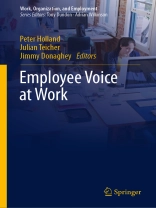This book addresses the contemporary aspects of employee voice through theoretical and practical analysis. In addition to case studies of employee voice in the workplace, it also looks at emerging forms of voice associated with the use of technology such as social media. Because of the breadth of the concept of employee voice, the focus of the book lends itself to an international perspective on employment relations and human resources management – analyses and experiences drawn from one country will be usefully considered or applied in relation to others.
Table des matières
Part 1: Employee Voice: What’s it all about?.- Chapter 1: The Evolution of Employee Voice.- Chapter 2: Employee Voice – Theoretical Perspectives.- Chapter 3: Employee Voice and the Changing Workplace.- Chapter 4: Voice and Participation: The European Experience.- Chapter 5: Voice and Participation: The Anglo-American Perspective.- Part 2: Dimensions of Employee Voice.- Chapter 6: Voice and Performance.- Chapter 7: Employee Voice and Social Media .- Chapter 8: E-voice and Unions.- Chapter 9: Employee Voice, Job (In)Security and Silence.- Part 3: Employee Voice in Practice.- Chapter 10: Employee Voice in the Manufacturing Sector.- Chapter 11: Employee Voice in Continuous Service Delivery.- Chapter 12: Employee Voice in a Privatised Public Utility.- Chapter 13: Employee Voice in a Multi-stakeholder Environment.
A propos de l’auteur
Peter Holland is Professor of Human Resource Management and Director of the Executive MBA at Swinburne University of Technology, Melbourne, Australia. He has worked in the Australian finance sector and consulted to the private and public sector in a variety areas related to human resource management and employee relations. His current research interests include employee voice, workplace electronic monitoring and surveillance, and talent management.
Julian Teicher is Professor Human Resources and Employment and Deputy Dean (Research) in the School of Business and Law at Central Queensland University, Melbourne, Australia. In the early part of his career he worked as an industrial relations officer for two unions, one in the maritime and power industries and the other in nursing. His research is in two related fields: workplace (industrial) relations and public policy and management. He has published widely on a range of topics including: conflict management, employee participation, voice and industrial democracy, bargaining and dispute resolution, and training and skill formation.
Jimmy Donaghey is Professor of Employment Relations at the Industrial Relations Research Unit, Warwick Business School, University of Warwick, UK and Adjunct Professor at Monash University, Melbourne, Australia. His research interests focus on the internationalization of employment relations and worker voice.












